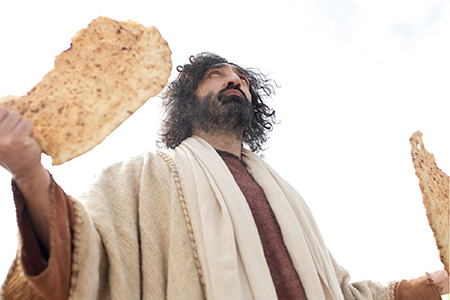 Genesis 14:18:20
Genesis 14:18:20
 1 Corinthians 11:23-26
1 Corinthians 11:23-26
 Luke 9:11B-17
Luke 9:11B-17
The miracle story in today's Gospel Reading has been recounted by all of the four evangelists (rf Mt 14:13-21, Mk 6:31-44, Lk 9:11-17, Jn 6:1-14). Obviously, this miracle, with its Eucharistic colouring, is considered of paramount importance in the primitive apostolic preaching. The early Christians perceived that it was a prophecy-in-act which foretold Jesus at the Last Supper and later at their own breaking of the bread (rf Acts 2:42). Indeed, the Church recognizes the closeness of the parallel in the very actions of Jesus (take, bless, break and give) that this four-fold action becomes the central and essential part of her liturgical celebration. As often as we hear or see these four words, we think of Communion; but these very words have already been realized in Jesus' life . . .
With only five loaves, two fish but a few thousand people, Jesus in His compassion, nevertheless took up what was available – a gesture of willingness to do something for others against all odds. In His love for us, He took “the form of a slave, being born in human likeness . . .” (Phil 2:7). He willingly took up the cross, laid upon Himself all of our offences and by His death, took away the sins of the world.
Jesus blessed the bread and the fish. In Hebrew tradition, to bless a meal is to give thanks for it. Jesus gave thanks to His Father for His provisions even though they were scanty. And though He is God, but as the Son, Jesus often thanks His heavenly Father in prayers (rf Mt 11:25, Lk 10:21, Jn 11:40-42). He is thankful even at the Last Supper when facing His imminent death which is according to His Father's will (rf Mk 14:22-23, Mt 26:25-28, Lk 22:17-20).
Jesus broke the bread and gave them to His disciples to be distributed among the hungry crowd. The bread has to be broken in order to be given and shared. By sharing, “all ate and were satisfied” (Lk 9:17). There was even leftover to be gathered up. As the Bread of Life, Jesus was broken on the cross so that becoming food Himself, He gave us eternal life. In Holy Communion, Jesus being present in the form of bread, is broken into many pieces. By eating and sharing this broken bread, we who are many are gathered together and become one in Christ (rf 1 Cor 10:17).
Inasmuch as these four words summarized Jesus' life, they reflect a pattern of our Christian life as well. In baptism, we take on a new identity as God has taken us as His children. We are blessed and with a grateful attitude, we give thanks for all the grace and gifts we receive. We are broken by pain, grief and disappointments in life, but God gives us strength to start anew each time we turn to Him for help.
Not limited to the earthly aspects, these four words also act as the pointers for our spiritual lives as Christians. Modelling the gestures of Jesus, we should accept the lives that God has given us. We should place our trust in His beneficence and love, and take up our daily cross as the crucible of His design and will. With a thankful spirit, we should be grateful for everything that God provides, even though they seem to have little or no value at all. We should break up our pride, selfishness and bad habits. We should share the gifts we have received and give ourselves in service to others. In this way, not only do we become “salt of the earth” and “light of the world” (rf Mt 5:13-16), but also as bread – taken, blessed, broken and given – for each other. In this way, our lives would be truly Eucharistic in nature like Jesus.
take us , bless us, break us, give us to others,
so that in you we may be instruments of salvation for the world.
Amen
(Taken from Living with Christ Sunday Missal 2018-2019 Pg 613)
